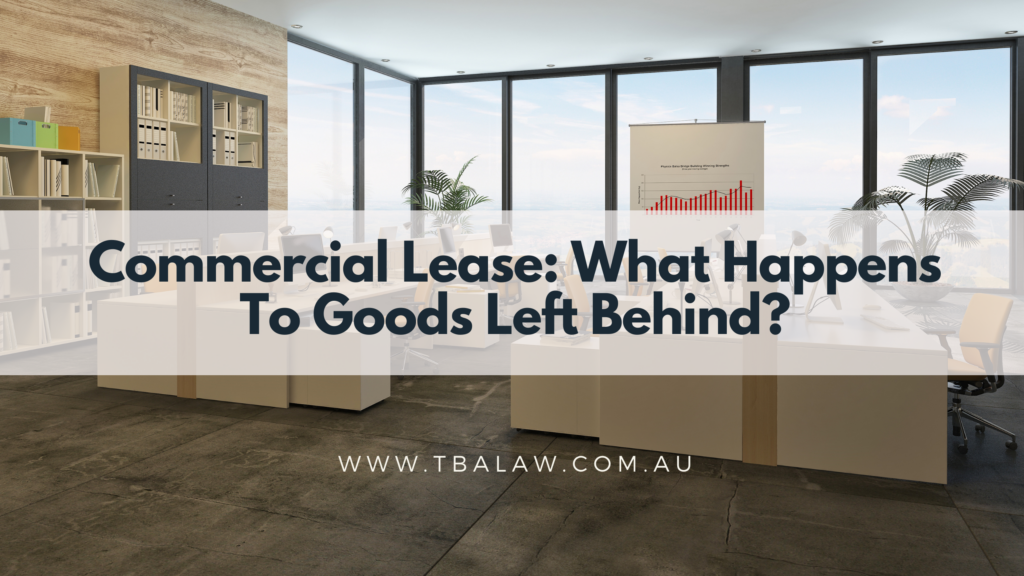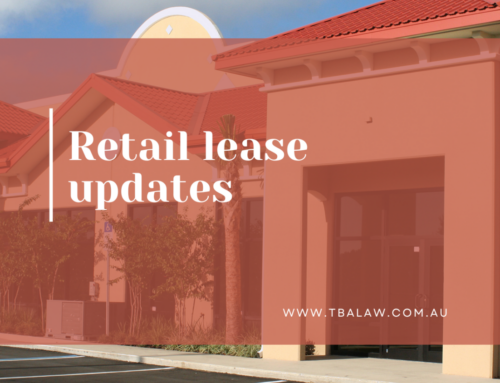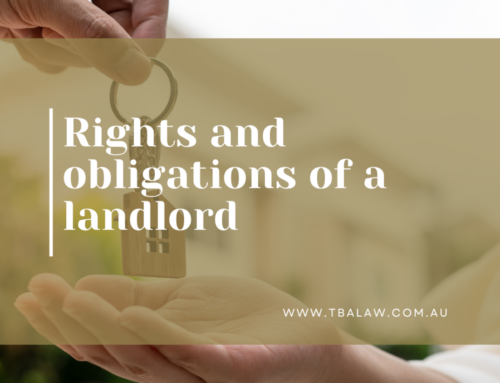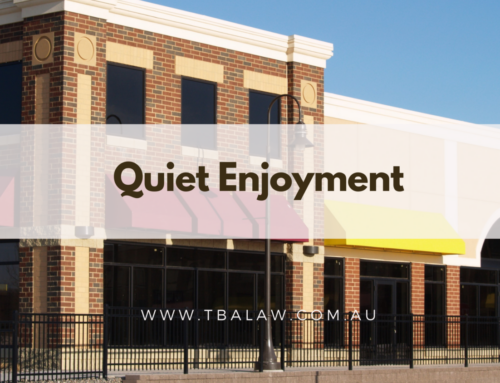What happens to goods that are left behind when a tenant vacates a premises?
For a commercial or retail lease, sometimes a tenant leaves. It could be at the end of a lease, or earlier. Either way, sometimes they might leave stuff behind. And if that happens, what do you do with it as a landlord?
If motor vehicles are left behind, that is dealt with differently. So this is for goods such as stock, business equipment, furniture, or rubbish even.
The first place to start is your Lease – see if there’s a clause about abandoned goods.
If you have no Lease in place, or there is nothing in your lease that covers this situation, then you are covered by the Australian Consumer Law (ACL). So we’re dealing with division 4.2, if anyone’s interested in looking it up.

There’s a differences between low, medium and high value goods that are left behind. Low value, is less than $200. Medium value goods are between $200 and $5,000, that might be stock. High value items are worth more than $5,000.
So, what does abandoned means? Well, it means that the tenant hasn’t collected or taken delivery or given direction for the delivery of goods and therefore it’s the landlord that needs to dispose of them. Now you might think, the tenant’s gone, I can just chuck this stuff out or I can sell it because then I can make back some of the money I’ve lost or something like that. You can’t do either of that, unfortunately, and this is what you need to do. You need to give written notice to your tenant, 28 days, that you intend to dispose of the goods in 28 days. This written notice can be physically given to them, or it can be by mail, needs to be written and keep a record of it. Then If no directions have come in that 28 days, that is where you can then go about disposing of the goods. In the meantime, you need to store the goods safely.
What do you need to have in the notice? You need to have the tenant or receiver’s name. We’re calling it the tenant, legislation calls them the receiver. Description of the goods, so the gym equipment. Address where the goods may be collected such as, currently stored at ABC storage facilities in Single. You also need a statement of the relative charge for storing the goods. Now this means, for example, say ABC Storage in Single is going to charge 50 bucks to store the gym equipment for 28 days, you need to state that in your notice. You also need to state in the notice that after a specified date, which would generally be the date of the 28 days or more, that the goods will be disposed of unless they’re collected. And that charge that you’ve quoted is paid.
Now, if it’s applicable, you need to also state that the receiver will retain the proceeds of the sale of the goods if they’re disposed of, not exceeding the sum of the relevant charges and cost for the disposal of the goods. So we get into that. That’s the next bit we’re talking about.
For medium and high value goods. So remember that is $200 to 5,000 and above 5,000. So here, we’re talking about the stock, here we’re talking about the gym equipment, but we’re not talking vehicles, at all. It would be really a good idea if the landlord does a PPSR search to ensure that there’s nothing owing on the goods. So essentially what a PPSR search is for those that aren’t aware is a PPSR is where you can register securities on goods. So just like if you take out a mortgage to buy a house and land, the bank’s going to register the mortgage on the title of the property. It’s the same sort of thing. If say, for example, let’s take your gym equipment. It might be worth 20 grand. If the person has taken out a loan, a business loan to purchase that equipment, that could be registered on the PPSR, which is of course, the Personal Properties Security Register. So you need to check that. Really good idea to check that. And you can do this online, or you can ask someone like a solicitor to assist you with that.
So, what happens if you cannot locate the provider, which is the tenant, remember, receiver’s a landlord, provider’s a tenant. So if you can’t locate the tenant, what do you do? They’ve done a runner, they’ve just left, they’ve abandoned the premises and you don’t know where they’ve gone and they’ve left their stuff. It depends on if it’s low value or high value goods. So low value goods, 60 days need to elapse from the date that the goods became uncollected goods. When that occurs, you can then dispose of the goods for sale, destruction, appropriation, or other means. And yes, I took those words straight out of the legislation. Medium value goods, 90 days must elapse before you can dispose of the uncollected goods. And you could do that by public auction or private sale. And you need to take reasonable care to get the best price possible. So you’ve got 20 grands worth of gym equipment, you’re not going to sell it for $10.
High value goods. Remember, that’s over 5,000 bucks. I just realized my example, given before wasn’t quite accurate, but you get what I mean. 180 days must elapse for high value goods. So that’s over five grand. Goods must be disposed of by public auction, advertised at least seven days in advance or by private sale if that notice has been given and that the landlord or receiver believes that, a reasonable belief that the best price will be achieved through a private sale, not a public auction. So there you go. Your tenant has abandoned the premises, left you goods, what do you do? Depending on the value of the goods you’ve got a serve notice on the tenant of when it can be collected and that in 28 days it’s going to be disposed of, and you need to give instructions for where it’s going to be stored during that time, because you need to safety store for those 28 days, and how much that’s going to cost. And they’re going to be reliable for that.
Then, if you can’t find the tenants because they have shot through, fly by night, what do you do then? That’s when you need to give, depending on the value of the goods, low, medium, high, you need to give your 60, 90, 180 days notice, and then you need to, low value of goods, dispose of them, medium and high value, sell by public auction or private sale.
If this has occurred, there’s a few things that you, as the landlord need to do after you’ve sold the goods. You must keep a written record of description of the goods. Keep a copy of the notice that you’ve sent. Keep records of the date and the manner in which you’ve disposed of the goods, whether you’ve tossed them at the tip, whether you have privately sold them online, whether you have gone through public auction, whether you’ve given them away, whether you’ve put them out for high rubbish. If sold at a public auction, you need to have the name and the address of the auctioneer. If sold by private sale, you need to have the name and address the purchaser. And you also need to know the price that the goods were sold. You need to keep the record for at least six years, and you need to have prepared all of this within seven days of disposing of the goods. So it’s important, there’s some timeframes here.
Be very careful, with you notice there’s specific wording that needs to be used, so if you’re not confident, speak to a legal practitioner that’s experienced in this area to make sure that you get the wording right, so that you are covered and that you’re protected, if you’re the landlord. All right, here’s the bad news. You can’t just keep the proceeds of the sale. You can’t keep the 20 grand that you get from the gym equipment, much in all this common sense would almost say, but you can’t do it unfortunately. But that doesn’t mean you can’t keep something. You may retain the relevant charge, which is the reasonable cost of your storage and maintaining and disposing of the goods.
So if it’s cost you $500 to store those goods at ABC Storage, and it’s cost you $200 to keep the equipment maintained to a reasonable level during that time. And then it’s cost you another $150 to sell that by public auction, you can keep that. So keep your record receipts and all of that, of what you’ve spent and make sure it’s reasonable, what you’ve spent. And you can keep that from the proceeds. Yeah? All right. The remaining proceeds, this is the really sad bit. The remaining proceeds are say, you’ve spent a thousand bucks of your 20,000 bucks on new expenses, the other $19,000 you’ve got there, it needs to be deposited with the State Revenue Office as unclaimed money. So unfortunately, it does mean that you go through all of these hoops and at the end of it, you really only get back what you spent, but as long as you have done the steps that’s required under the legislation, then you will be protected when you dispose of the goods that have been left behind that technically do not belong to you.
If you’re a tenant, whether you’re a fly by night getting out of there, abandoning and disappearing, or whether something’s happened that your lease has ended, or you are needed to relocate, or you’ve abandoned the premises for some other reason, obviously it’s best to take your goods with you because then you’ve got it and you don’t have to go through all of these things. If you’ve got a forwarding address, that’s really good, because then if something is left behind, be it intentionally or accidentally, the landlord’s got somewhere they can go to contact you to say, “Hey, you’ve left this behind. You’ve left 800 bucks worth of stock and clothing in the back room.” So that’s something for a tenant, well, for both parties, really, to be aware of, but for a tenant to be aware of. And also, the landlord needs to be very aware of what they’re doing, whatever you do, don’t just throw things out and whatever you do, keep your records. And always, always seek legal advice if you need to.





Leave A Comment